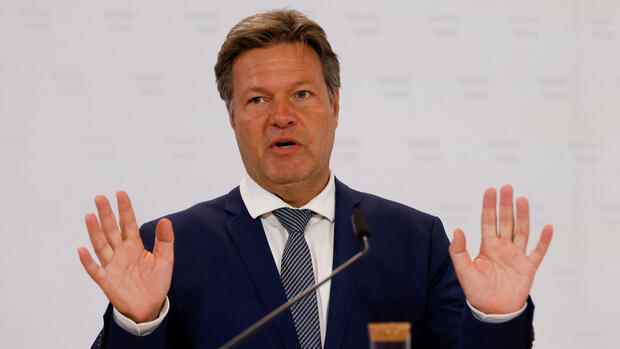Berlin Germany’s top consumer advocate, Ramona Pop, has rejected the idea of Federal Economics Minister Robert Habeck (Greens) to reconsider the priority given to private households in the allocation of gas in the event of a dramatic energy shortage. The fact that the Minister of Economic Affairs is questioning the law in force “increases people’s uncertainty,” said the head of the Federal Association of Consumer Organizations (VZBV) to the Handelsblatt.
SPD leader Saskia Esken is also pushing for private households to be prioritized over industry. She told the “Rheinische Post” that the gas emergency plan stipulates that social institutions and private households are particularly protected. In her view, schools are also part of this.
In the event of gas bottlenecks, private households and critical infrastructure such as hospitals are to be supplied first. Industry and other companies would lose out. According to Habeck, this scenario is more suitable for a short-term failure, but not for the bottlenecks that are now threatening.
Top jobs of the day
Find the best jobs now and
be notified by email.
“No one should freeze,” he said. However, private households must also be held accountable. Otherwise there will be massive consequences for industry and the economy as a whole.
Foreign trade association emphasizes the relevance of cold chains when allocating gas
The President of the foreign trade association BGA, Dirk Jandura, pointed out the relevance of cold chains when prioritizing. These are essential for the supply of food and medicine and are therefore systemically important, he said.
>> Read also: Reconstructing a state failure: How Germany ran into Putin’s energy trap
Berlin’s SPD state and parliamentary group leader, Raed Saleh, believes it is right to secure industry and jobs. “But Habeck wants to pass on the feared cost explosions of up to 500 percent to consumers,” Saleh told the “Tagesspiegel”.
Russia had already significantly reduced gas supplies recently. Due to the maintenance of the Nord Stream 1 pipeline, they have even been at zero since the beginning of the week. It is unclear whether deliveries will start again after the maintenance – and how strong. Habeck spoke of dark clouds on the horizon. Scenarios had to be discussed that had been unimaginable for a long time. “Now time is of the essence.”
So far, Germany’s alternative sources of conventional natural gas have primarily included the Netherlands and Norway. In the case of liquid gas, Habeck tried to find new supply relationships on a trip to Qatar in the spring. Whether, when and how much more gas will actually come from the emirate is an open question. The filling level of the German gas storage facilities is increasing slowly but steadily. It is currently around 65 percent.
Because of the impending gas shortage, consumer advocate Pop sees an urgent need for action. She accused the federal government of not doing enough to protect consumers. Habeck is now talking about a “nightmare scenario” in the event of a gas supply stop from Russia and Chancellor Olaf Scholz (SPD) about “social explosives”.
“The federal government must now prepare a third relief package”
Precautions must therefore now be taken in the event of an emergency – and not just for struggling energy companies such as the gas supplier Uniper, the consumer advocate warned. The federal government has promised help to the energy company, which has gotten into trouble as a result of the gas crisis, and is examining other options in addition to participation.
>> Read also: FDP and CDU fight for longer use of nuclear power – sharp reaction from the Ministry of Environment
Pop urges that the focus of aid should now be placed more on consumers. “The federal government must now prepare a third relief package and not only when the high costs have already had an impact,” said the VZBV boss.
In particular, people with low, but increasingly also middle-income, would no longer be able to pay their bills if prices exploded, Pop warned. She called for a higher heating cost subsidy, in particular for housing benefit recipients and pensioners, which had to be linked to price developments.
SPD chairwoman Esken spoke out in favor of a “protective shield” for consumers who could no longer afford the high energy prices. This should guarantee “that the apartment stays warm and energy affordable”. Esken did not say how this protective shield should be implemented.
Pop called for a moratorium on electricity, gas and district heating cuts and for the costs to be covered in the event of insolvency. “This requires clarity in the implementation,” warned the consumer advocate. “Will such a moratorium come, and how will it work?”
The order of the day is also for everyone: save energy, Pop continued. Everyone would have to face up to their responsibilities here – industry, trade, commerce, the public sector and private households. “But please be fair, just and transparent.”
The Federal Government and the Federal Network Agency have repeatedly called on consumers and industry to save energy. The President of the Association of German Chambers of Industry and Commerce, Peter Adrian, asked private consumers and less energy-intensive companies to start saving energy consistently out of solidarity with industry.
“There are real supply bottlenecks, and our entire economy is threatened with a crisis of an unknown extent,” Adrian told the Rheinische Post. “The consequences of shutting down individual sectors or companies cannot be overlooked.”
More: Driving, drinking water, mobile phone contracts: How you can reduce your expenses in everyday life

